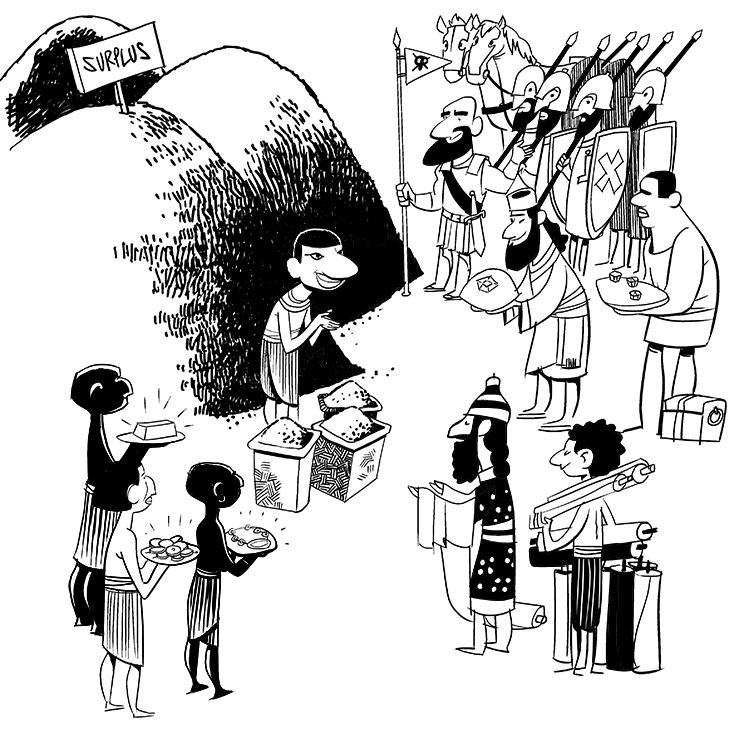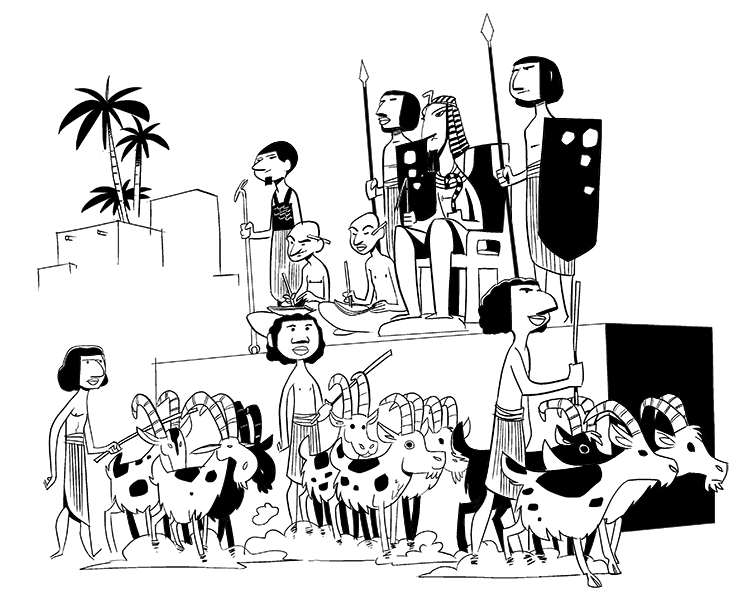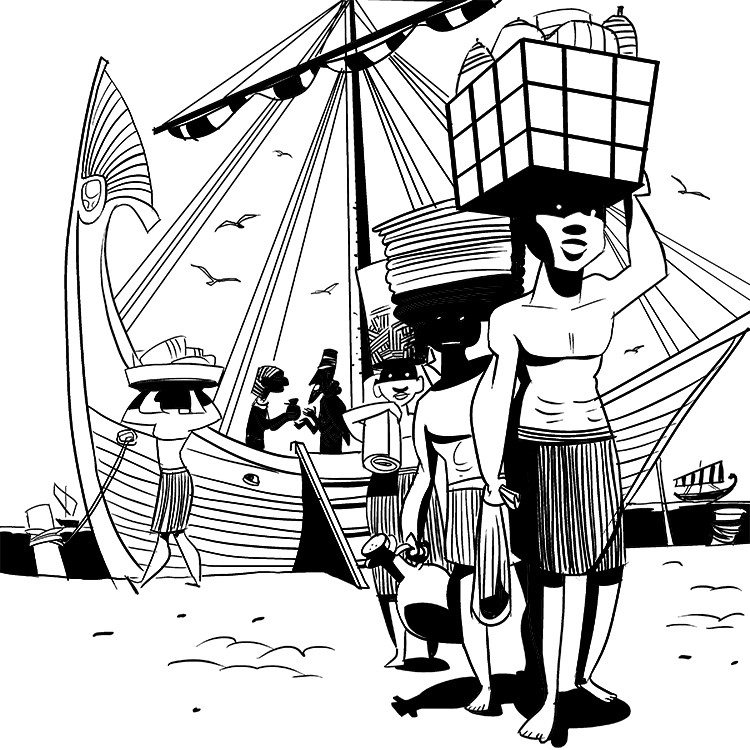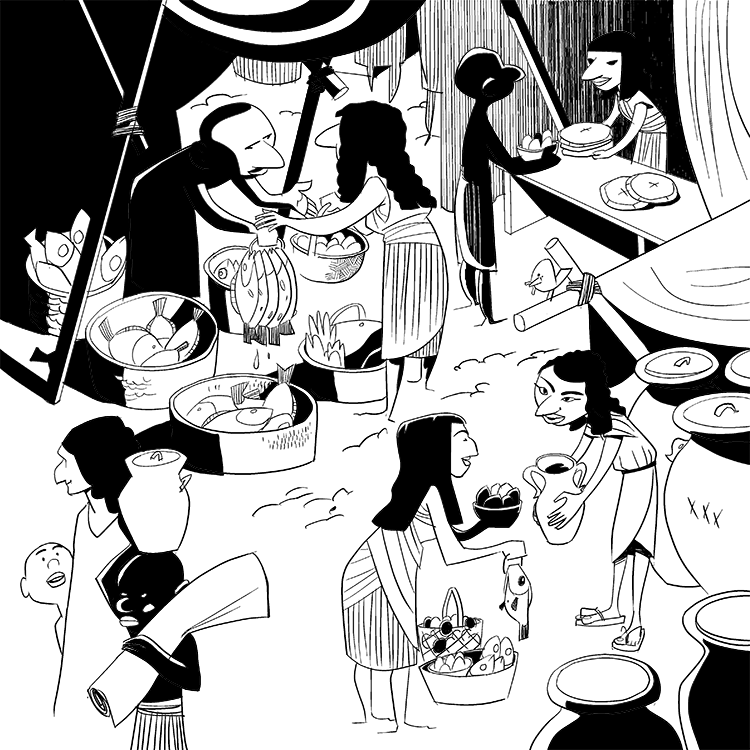Whether it’s two countries swapping luxury goods, two sports teams dealing players, or two kids exchanging their least favorite snacks in the lunchroom, trade has always been an important part of human life.
For the Ancient Egyptians, though, trade was the lifeblood of their civilization. It’s what allowed them to connect with other cultures and build an empire that has gone down in history as one of the most powerful ever.

Why Did the Ancient Egyptians Trade?
Trade is not something that is specific to the Egyptians, so we might as well ask why anyone trades. Well, put simply, people trade when they have extra stuff and are willing to give it to someone else in exchange for something they need or want.
For the Egyptians, they typically had a major surplus of wheat, which also happens to be one of the principal food crops for almost every civilization ever.
These surpluses came because the land surrounding the Nile River is some of the most fertile in the world. So, as long as the flood was good that year, they were usually able to produce much more than they needed.
Of course, they could have just stored this grain for later. But if they knew the next year was going to produce another surplus, what would be the point of that?
Instead, they could contact people in other parts of the world, such as the Libyans, Nubians, Greeks, Lydians, Assyrians, Phoenicians, and so on, and say, “Hey! We have extra grain. What you got?”
For this to work, it was necessary for the other party to have a shortage of grain. But since few places were as agriculturally productive as Egypt, there was almost always a buyer.

Making Friends Through Trade
Just having a surplus is often enough of a reason to trade, but there were other motives. Trading with someone helped to build diplomatic ties. Since both parties benefited, it was kind of a “I’ll scratch your back if you scratch mine” kind of thing.
Sometimes, these ties could be leveraged for other things, such as support during a war.
Trade also did something else for Egypt: it helped it get rich. Because it had so much grain — something you need — they could almost always find a buyer, and their price was often high. They would trade grain for metal, wood, and other precious stones.
The influx of all of these goods helped make Egypt rich, and this wealth in turn helped make it more powerful. This created a beneficial cycle that would help Egypt grow into one of the most powerful civilizations of the ancient world.
So, after seeing all the benefits, perhaps the better question to ask is: why wouldn’t Egypt trade?
Who Did Egypt Trade With?
Trade naturally must involve two parties, but you don’t always have to trade with a foreign nation. Domestic trade can be really impactful as well. The Egyptians did both, and this had a tremendous effect on the growth of their civilization.
Trade Within Egypt
Way back when, before 3150 BC, there were actually two Egypts: Upper Egypt and Lower Egypt.
Upper Egypt was to the south, located “up” in the highlands where the Nile River began, and Lower Egypt was located in the north, “down” on the floodplains of the Nile Delta.
For several millennia, these two regions developed independently from one another, yet they grew closer and closer over time thanks to trade.
The Nile River was a natural highway that connected the two regions and made it possible for the many cities and towns located along its banks to get to know one another, often by trading goods, as well as ideas.
Eventually, the cities and towns in each region united to form two separate kingdoms. But in 3150 BC, the Nile brought these two lands even closer, uniting them under one ruler and giving birth to Egypt as we know it.
There were other reasons for this unification — religion, war, politics, etc. — but the initial bonds were formed thanks to the trade that took place between the two regions as they developed separately from one another.

Redistributing Wealth and Resources
Were the ancient Egyptians communists? Not in the modern sense of the term, but they did have a rather progressive system for wealth distribution that worked through a form of trade.
Essentially, the pharaoh, the Egyptian ruler, was considered to be the protector of all of Egypt. He owned all land (well, the gods owned it, but since he was a god and a human, he owned it in the physical world). But he wasn’t free to do whatever he wanted with it. Instead, he was charged with maintaining maat, the Egyptian concept of truth, justice, and cosmic order.
Part of maintaining maat was ensuring that the people of Egypt were content, mainly that they had enough food and other resources to survive. After all, how could a pharaoh claim he was upholding the cosmic order if his people were going hungry?
To do this, the Egyptians developed an elaborate system of trade that brought goods from all over Egypt into the capital (which was often Memphis or Thebes but changed quite a bit). From there, these goods were sent to other parts of Egypt to ensure everyone had enough. When there was a surplus, the pharaoh was given a big pat on the back and he could trade these goods with other nations.
When there wasn’t enough, this was a big red flag that perhaps the pharaoh had done something to anger the gods. And since the gods were the true rulers of Ancient Egypt, this was like being put on the hot seat.
Priests would be called in to figure out what could be done, and if problems persisted, the pharaoh might be removed from his position. Talk about a walk of shame!
While this system might not first appear to be trade, that’s exactly what it was, and it helped Egypt build a prosperous and healthy society that would flourish for thousands of years.

Trade with Foreign Nations
In addition to trading amongst themselves, the Ancient Egyptians were also quite interested in trading with other nations.
Several colonies were established throughout the ancient world, in lands such as Cannan, Syria, Punt, and Nubia, whose sole purpose was to produce Egyptian goods, trade them with the locals, and then send the bounty back to Egypt.
Sometimes these colonies were established peacefully by working with the local authorities to make sure everything was okay. But other times they were set up by force, meaning the Egyptian army would move in, wage war, and then say, “this is ours now.”
Trade under these conditions was, let’s say, less-than-welcomed. But it was lucrative for the Egyptians all the same.
The best examples of this are the colonies Egypt established in Nubia, the kingdom just to the South.
These were set up through conquest and pretty much existed for the sole purpose of extracting gold and silver from their neighbors.
In fact, in Egyptian, the word nub translates to “gold,” and it’s believed this is the case because the Egyptians saw Nubia not so much as a nation but rather as a source for these precious metals. So much for befriending your neighbors!
Of course, people from all over the ancient world wanted the gold and silver the Egyptians got from Nubia, and this allowed the Egyptians to trade for even more goodies.
In addition to gold, silver, and wheat, the Egyptians also traded quite heavily in papyrus, a reed that grew in abundance along the banks of the Nile River and that could be used to make paper.
All in all, the Egyptians were lucky in that their land was abundant in a lot of stuff that people from all over the world really wanted. But luck can only take you so far. Their willingness to connect with other nations and form, or force, trade connections allowed them to use this resource wealth to build a powerful nation that was often the envy of the ancient world.

Money in Ancient Egypt: The Deben
For most of Ancient Egyptian history, there was no money. Trade was conducted through the barter system, meaning they just traded what they considered to be goods of equal value.
This obviously created some conflicts. Someone who really loves oranges might think they’re super valuable, but to the guy with the gold, they’re probably not worth all that much. To make things a bit easier on everyone, the Egyptians came up with the concept of the deben.
Goods that were equal to one deben could be fairly traded for other goods also equal to one deben. So, for example, if 10 bushels of wheat was considered to be worth one deben, and a cow was also considered to be worth one deben, then 10 bushels of wheat could be traded for the cow and everyone would walk away happy.
This is effectively how money works, but the difference in Ancient Egypt was that there were no coins. The deben was much more of a concept.
When the Persians conquered Egypt c. 500 BC, they introduced coins. But the deben system had been working for thousands of years before.
Interestingly, records indicate that three jugs of beer and a day’s labor were worth the same thing, so this was often used as a wage. Beer was quite popular in Egypt thanks to the abundance of grain (and because it was often considered cleaner than the regular water available.)
The worker could then take this beer and trade it for something else, or they could kick back and enjoy a few lukewarm ones after a hard day’s work.
Building a Civilization
While government and agriculture are important pillars of any civilization, it’s impossible to imagine Egypt rising to prominence without trade. It not only helped the country develop domestically, but it also forged connections with the outside world and brought tremendous wealth into Egypt.
All of this can be seen as an early lesson that it does indeed pay to be friendly to your neighbors.
Written by Matthew Jones
Illustrated by Pablo Velarde Diaz-Pache
